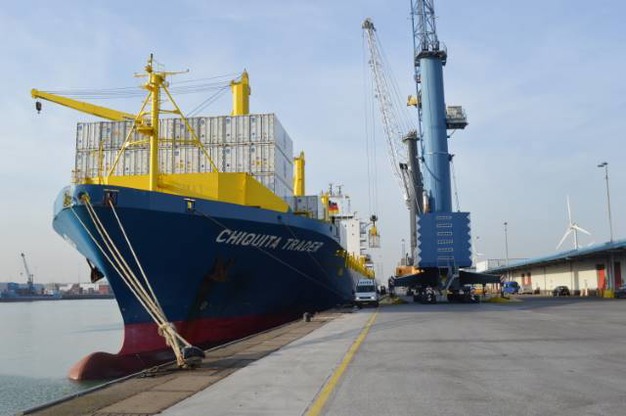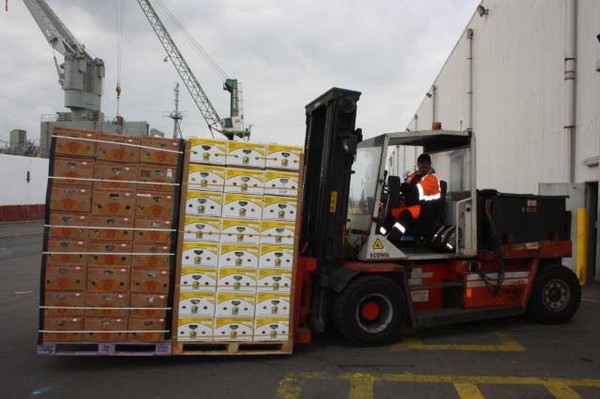Last week, the port of Rotterdam released the figures for the first quarter of 2020. The port expects a throughput drop of 9.3% compared to the first quarter of 2019. Allard Castelein, CEO of the port company, considers a loss of 10-20% annually most likely due to the impact of the Corona virus. A note to the figures is that this is a loss if the measures are still in place for a long time and that the comparison year of 2019 was a record year.
North Sea Port also expects goods throughput to decline. CEO Daan Schalk talks in the podcast of BNR Radio about a decrease of 5-6% in mid-April and expects to keep it limited to 10% for the ports of Vlissingen, Terneuzen and Ghent. Antwerp reports a growth of 4%, but expects the impact of the Corona virus to become noticeable in the figures for the second quarter.
Fruits and vegetables
Do the general figures for transshipment in ports also apply to fruit and vegetables? “We have not yet seen a real decline in the transshipment of fruit and vegetables,” says Gerben Paauwe, managing director at Kloosterboer Vlissingen. “It is going well everywhere, especially with bananas. There is currently more demand in Europe than usual. Only in our Value-Added Services such as the processing of fruit juices, have we seen a slight decline, but that is all. ”

Bananas in particular are doing well at Kloosterboer
The Corona crisis mainly affects the occupancy rate of the cold stores at Kloosterboer. “We see that our customers are buffering more and that products remain stationary in the port for longer than average. This means that currently more of our cooling capacity is occupied than usual. ”
Johan Claes, from Belgian New Fruit Wharf (BNFW), also has no complaints at the moment. “It is business as usual with relatively stable throughput. We can continue to work at normal speed in the ports of Hamburg, Rotterdam, Antwerp and Zeebrugge where we have our activities. We notice it especially in the extra measures we have to take to keep sufficient distance. It is mainly those measures that are causing rising costs at our port. ”
At Kloosterboer, they also see that the measures have an impact on work. “Keeping our distance and the various measures we take, such as staggered breaks, no more contact with drivers, disinfection, a little awareness of the employees and the remote working of many office workers do not make our work any easier,” says Gerben .
Reefer containers
Worldwide, the sector is faced with a shortage of reefer containers, but both parties are less affected by this for various reasons. “Our customers largely have their own reefer containers or have strict control over their containers,” says Gerben. "These containers are used, for example, on fixed "dedicated" routes, as a result of which they will not get stuck in the Asian ports." This includes, for example, Chiquita's own reefer containers that arrive weekly in the port of Vlissingen.

Both companies are not affected by the shortage of reefer containers
Johan points to the conventional reefer ships that can moor at the quay at SEA-invest, the umbrella company of the BNFW, whereby the cargo can be driven into the cold store. “That is a major advantage at the moment compared to the container terminals in the ports. At our terminals we can handle cargo from containers and conventional reefer ships at the same terminal. For example, we will soon receive some of the apples and kiwis from New Zealand that normally arrive in a reefer container by reefer ship, all in the same way, in the same cooling shed. Another advantage of a disadvantage is the logistics from the port to the customer. There is less traffic on the road, fewer traffic jams and therefore less delays for the drivers, so that everything can be unloaded and loaded on time. ”
For more information:
Gerben Paauwe
Kloosterboer Vlissingen 
Finlandseweg 10
4455 TE Nieuwdorp
Tel: +31 (0) 118 486200
gerben.paauwe@kloosterboer.nl
www.kloosterboer.com
Johan Claes
Belgian New Fruit Wharf nv 
Rostockweg 1 2030 Antwerp
Tel: +32 (0) 3 543 65 87
johan.claes@sea-invest.com
www.sea-invest.com
